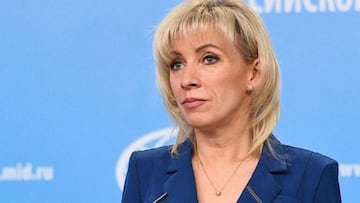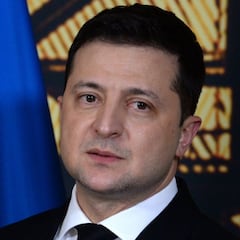Ukraine conflict: Russia issues Sweden and Finland NATO military threat
Russia's Ministry of Foreign Affairs warned Sweden and Finland of "serious political and military consequences" in the case they join the NATO alliance.

Prior to the invasion of Ukraine, the Kremlin sought assurances from NATO that its neighbour would not be permitted to join the military alliance. The basis of Russia’s security fears is the eastern encroachment of the North Atlantic Treaty member states towards its own borders, with Ukraine a vital buffer between NATO and Russia itself. Although Ukraine first attempted to join NATO in 2008 through the Membership Action Plan, this was shelved by Viktor Yanukovych after his election in 2010, Yulia Tymoshenko’s successor preferring to adopt a line of closer relations with Moscow.
Ukraine is an Enhanced Opportunities Partner of the alliance but not a full NATO member, which means that the treaty is powerless to intervene in the current conflict in Ukrainian soil. It is also a member of NATO’s Partnership for Peace (PfP) programme, along with Russia and 20 other states, mainly from the former Soviet bloc or within the geographical and political sphere of Moscow. Bill Clinton once described the PfP as a “track that will lead to NATO membership.” Only five EU members are currently members of the PfP, including Sweden and Finland, who have now come under the scrutiny of Moscow for their alignment with NATO. On Friday, a day after Russian troops invaded Ukraine, the Director of the Information and Press Department of the Russian Ministry of Foreign Affairs, Maria Zajarova, issued a stark warning to the potential future NATO members.
Related news
- Ukraine's Antonov AN-225 'Mriya', the largest plane in the world, destroyed by Russia
- Ukrainian and Russian armies compared
- Russian forces attack Kyiv: live updates
- Russian forces take control of area surrounding Chernobyl nuclear power plant
- Anonymous declares war against Russia: starting a cyber war
- Why is Ukraine's president Russia's "number one target?"
"Serious military and political consequences" for joining NATO
“It is clear that the alignment of Finland and Sweden, which is principally a military bloc, would have serious military and political consequences that would require our country to take reciprocal measures,” Zajarova said. “It is clear that all OSCE states, in their national capacity, including Sweden and Finland, reaffirmed at the time the principle that the security of some states should not be built at the expense of the security of other countries.”
Of the 15-post Soviet states that emerged from the collapse of the USSR in 1991, only three have become full NATO members: Estonia, Lithuania and Latvia, who joined in 2004. Ukraine, although not a member, is considered a strategic partner by NATO due to its proximity to Russia – one of the prime reasons for Moscow’s insistence that the country be denied full membership. The Russian hierarchy also considers NATO a tool to be deployed in defending US interests in the region. Ukraine joining the alliance would limit Moscow’s sway over its neighbour, which it historically views as an integral part of Russia in social, cultural and political terms. “Ukraine is an inalienable part of our own history, culture and spiritual space,” Vladimir Putin said shortly before he ordered troops into the Donbas region.
Statement by #NATO Heads of State and Government on Russia's attack on #Ukraine 🇺🇦#StandWithUkraine
— NATO (@NATO) February 25, 2022
Finland may seek NATO membership "in case of necessity"
At the last NATO meeting, the secretary general of the alliance, Jens Stoltenberg, invited Sweden and Finland to become permanent members.
Related stories
Finland’s Prime Minister Sanna Marin told Spanish daily EL PAÍS in January that membership of the bloc was not a priority for her nation, but added that in a case of necessity Finland would be prepared to ask to join NATO. “In the last few years, we have strengthened our relationship with NATO. We are not discussing that possibility right now, but we maintain the option to do so in the future," she said.
Following Zajarova’s statement, Swedish Prime Minister Magdalena Andersson reaffirmed her country’s position as an ally of NATO, but fell short of saying if Sweden’s stance on remaining outside of the alliance remained intact. “We are preparing for a situation that may be long-lasting," Andersson said.

